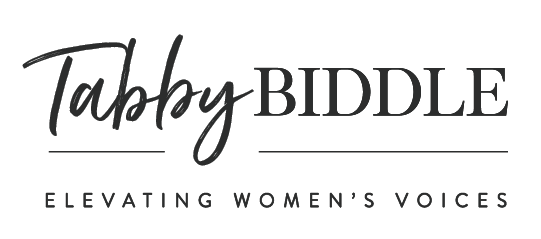How to Stop Procrastinating on Your Writing
by Tabby Biddle
As a writing coach for ambitious women who want to make a positive difference in the world, I have run across many women who want to use their voice for change, but struggle with actually putting their pen to paper and getting their writing projects done. There are so many other things vying for their attention—job responsibilities, other work projects, caring for their children, caring for elderly parents, managing health issues, running a household, and more.
When my son was two years old, I felt the call to write a book. I wanted to help more women find their voice and use it as activists, advocates, social changemakers and leaders in our world. But how was I going to find the time to write this book when I had a toddler and was working full-time?
In 2015, Find Your Voice: A Woman’s Call to Action, was published. I wrote this book in three months.
For this reason, I am often asked to share some tips to help busy women better manage their time so they can actually write. Please find below my suggestions. If you are struggling with putting your pen to paper, please try them!
4 Tips to Stop Procrastinating on Your Writing
1. Give Yourself Permission to Value Your Voice.
As women, we have spent so long being told explicitly and more subtly through microaggressions, including what we see represented in our culture, that our voices are less important than men’s voices, or don’t matter at all. When you start to procrastinate, it’s important to look at and acknowledge that this may be an underlying issue. You have to turn this old story on its head, value your very own voice, and rewrite the story. When you value your voice, this will make it much easier to show up for your writing!
2. Mark Your Calendar for Short, Consistent Chunks of Time.
I’m a proponent of scheduling small writing periods to start your project, and then growing from there. I’m also a proponent of scheduling what’s realistic for you so you can set yourself up for success. I told you that I wrote my book, Find Your Voice, when my son was two years old. What was realistic for me? I knew my best focus time was early morning. It’s also a sacred time. I practice yoga first thing in the morning, but I wondered if it would work to get up an hour earlier and write. So I did. I wrote from 6am – 7am, five days a week. And guess what? In a month, I had a rough draft of my book!
How much time can you realistically set aside right now? Less is better than more. Try starting with 20 minutes, twice a week. You’d be surprised at how much writing you can get done in 20 minutes. Mark your calendar right now for your writing time and consider it sacred. This dedicated writing time will do wonders for your project, and for you. It will start nourishing your both of you. It’s like caring for a child—5 minutes of high-quality focused time can go a long way, as compared to 1 hour of distracted time, or not showing up at all!
3. Just Show up to the Paper.
You may resist showing up for your designated writing time, but once you’re there, you will be so happy that you showed up. For the yoga practitioners reading this, you may have heard the expression, “Just show up to the mat.” Once you are there, you start moving around and your body starts loosening up, you start breathing more deeply, you are feeling gooooood. It’s the same with writing. Just show up to the paper. Once you’re there, give yourself permission to be messy and raw. Your writing might not even make sense at first. Just write and get that pen moving. You will be amazed at what can be revealed (and accomplished) when you just show up to the paper.
4. Set a Timer to Hold Space for You.
It can feel unsettling to show up to write and not be held in a safe and secure container. That’s what writing groups are for. But, if you are not currently in a writing group, I suggest you use a timer to hold the space for you. This way someone (or rather, something) is keeping time for you and you don’t need to distract yourself by constantly looking at the clock. Set your timer to hold space for you, get that pen moving and start expressing yourself. For those of you who meditate, this is the same concept. When you set your timer, your mind can relax because someone (or something) is holding the boundary for you. Try it and see how this works for you!
As a female changemaker, your self-expression is too important to let it fall to the wayside. Please try these tips this week and let me know how it goes!
Tabby Biddle, M.S. Ed. is a women’s leadership coach, writer and consultant dedicated to uplifting and championing women’s voices. She is a two-time United Nations Foundation Press Fellow, and the creator of Women on Stage and the Divine Feminine Writer’s Group. Curious to learn more? Visit tabbybiddle.com.


